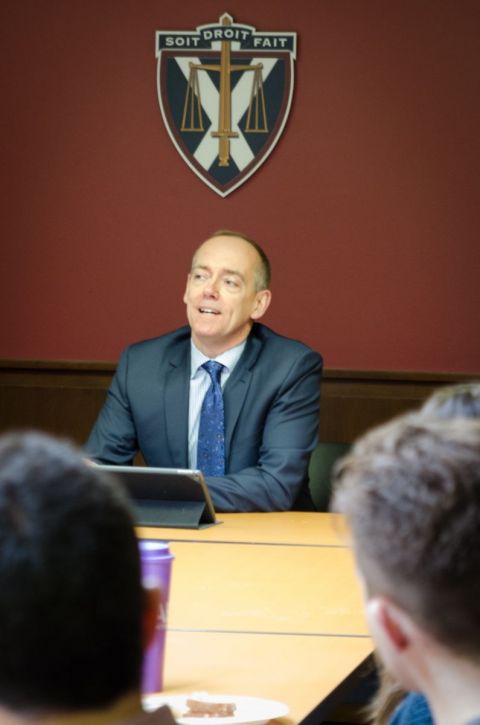
Queen’s students got an inside look at one of Canada’s key courts on January 18, with a visit from Justice Grant Huscroft, Law’84, of the Ontario Court of Appeal for a Q&A with students and faculty.
Huscroft got started by reminiscing about his time here. “I am a very proud graduate of this law school,” he said. “I cherish my memories at Queen’s.”
As a professor at Western from 2002 to 2014, Huscroft focused his research and teaching on constitutional and administrative law. His work usually had a comparative perspective, coming from his experience in New Zealand, where he received his LLM and was a faculty member at the University of Auckland from 1992 to 2001. The federal government elevated him directly from his academic position to the Ontario Court of Appeal in 2014, the first time this has happened in 50 years.
“I think there is a role for academics on appellate courts, they bring something different,” said Huscroft. However, the two roles are very different. “One of the delights of being an academic was saying whatever I thought and doing research on whatever I was interested in. As a judge, my duty is to resolve appeals based on the submissions of the parties.”
Among the many questions asked, one first-year law student asked about the discussions between judges that form part of drafting a decision. Huscroft’s response highlighted how, in the judicial forum, there are different ways of looking at a problem with different people from different perspectives. “For any decision there is discussion: How should we deal with this? What do we need to do to resolve the case? Do we need to clarify the law? These are all questions that might arise in drafting a decision.”
Throughout the Q&A, Huscroft highlighted the value of disagreement. “The most important thing I learned as an academic is that disagreement is almost always in good faith,” he said. “I think we have to approach disputes about rights or the Charter with a great deal of humility and we have to start with the position that however strongly we may feel, we might be wrong.”